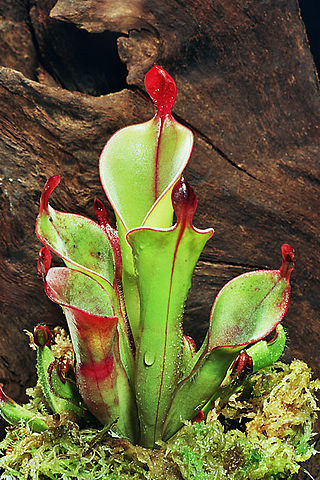
Sarraceniaceae are a family of pitcher plants, belonging to order Ericales.

The little stint is a very small wader. It breeds in arctic Europe and Asia, and is a long-distance migrant, wintering south to Africa and south Asia. It occasionally is a vagrant to North America and to Australia. The genus name is from Ancient Greek kalidris or skalidris, a term used by Aristotle for some grey-coloured waterside birds. The specific minuta is Latin for "small.

Tagetes is a genus of 50 species of annual or perennial, mostly herbaceous plants in the family Asteraceae. They are among several groups of plants known in English as marigolds. The genus Tagetes was described by Carl Linnaeus in 1753.

Marsilea is a genus of approximately 65 species of aquatic ferns of the family Marsileaceae. The name honours Italian naturalist Luigi Ferdinando Marsili (1656–1730).
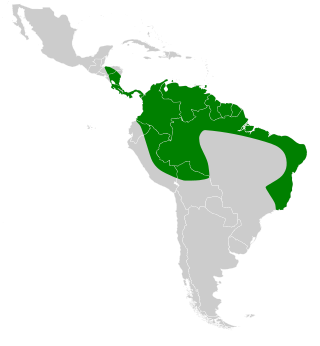
The white-bellied big-eared bat is a bat species from South and Central America, as well as Trinidad and Tobago in the Caribbean.
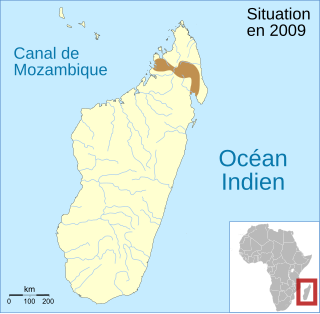
Rhombophryne minuta is a species of frog in the family Microhylidae. It is endemic to northern Madagascar. It has been mixed with other species such as Rhombophryne mangabensis; it is known with certainty only from the Marojejy National Park.

The marsh tchagra or blackcap bush-shrike is a species of passerine bird placed in the monotypic genus Bocagia in the family Malaconotidae. It is native to marshes in the tropics and subtropics of Africa. It is sometimes placed in the genus Tchagra.

Tagetes minuta is a tall upright marigold plant from the genus Tagetes, with small flowers, native to the southern half of South America. Since Spanish colonization, it has been introduced around the world, and has become naturalized in Europe, Asia, Australasia, North America, and Africa. Tagetes minuta has numerous local names that vary by region. In the Andes it is known as Huacatay or Wacatay, and in other regions it is common as chinchilla, chiquilla, chilca, zuico, suico, or anisillo. Other names include muster John Henry, southern marigold, khakibos, stinking roger, wild marigold, and black mint. It is called by the Quechua terms huacatay in Peru or wakataya in Bolivia.
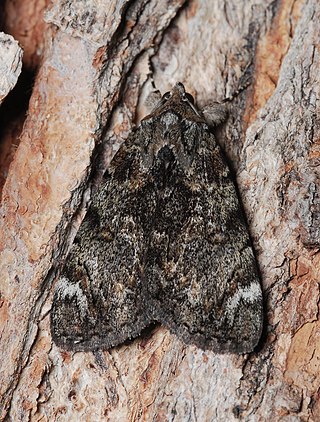
Catocala minuta, the little underwing, is a moth of the family Erebidae. The species was first described by William Henry Edwards in 1864. It is found in the US from New York to Florida and west to Texas and north to South Dakota, Indiana and Michigan.
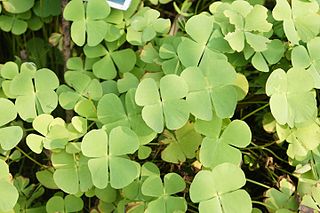
Marsilea minuta, or dwarf waterclover is a species of aquatic fern in the family Marsileaceae. It is not to be confused with Marsilea minutaE.Fourn. 1880, which is a synonym for Marsilea vestita. Other common names include gelid waterklawer, small water clover, airy pepperwort, and pepperwort, though the lattermost also applies to plants in the genus Lepidium. In French it is called marsilea à quatre feuilles and petite marsilée, the latter appearing to be a calque with the Latin botanical name. In Chinese it is 南国田字草, literally "southern field word grass," referencing the similarity of the leaflet shape to the Chinese character for "field." The Koch Rajbongshi people and Garo people call it shusni shak. It is called 'শুশনি শাক' in Bengali. In parts of India it can be called sunisanakka In Indonesian it is semanggi, but this name also applies to Marsilea crenata. In Japanese it is nangokudenjiso and in Thai it is phakwaen. In Malaysian it is tapak itik. In the Philippines it is kaya-kayapuan.
Tumidagena minuta is a species of delphacid planthopper in the family Delphacidae. It is found in North America.
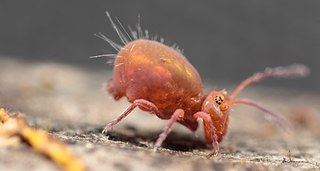
Dicyrtominae is a subfamily of globular springtails in the family Dicyrtomidae. There are at least 3 genera and 30 described species in Dicyrtominae.
Agroeca minuta is a species of liocranid sac spider in the family Liocranidae. It is found in the United States.
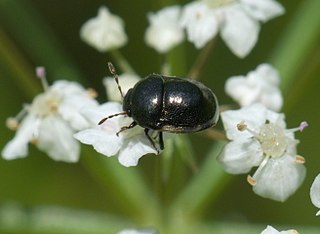
Corimelaena is a genus of ebony bugs in the family Thyreocoridae. There are at least 20 described species in Corimelaena.
Eulechriops minutus is a species of true weevil in the beetle family Curculionidae. It is found in North America.

Schroederella is a genus of flies in the family Heleomyzidae. There are about 14 described species in Schroederella.

Euphilotes bernardino, the Bernardino blue, is a butterfly in the family Lycaenidae. The species was first described by William Barnes and James Halliday McDunnough in 1916. It is found in North America.

Dicyrtomina is a genus of globular springtails in the family Dicyrtomidae..
Dicrodiplosis is a genus of gall midges in the family Cecidomyiidae. There are about 15 described species in Dicrodiplosis.

Trachypepla minuta is a moth of the family Oecophoridae first described by Alfred Philpott in 1931. It is endemic to New Zealand and has been collected in Auckland. Adults of this species are on the wing in December. It is distinguishable from similar species as it is smaller in size and darker in appearance than other species in the genus Trachypepla.

















